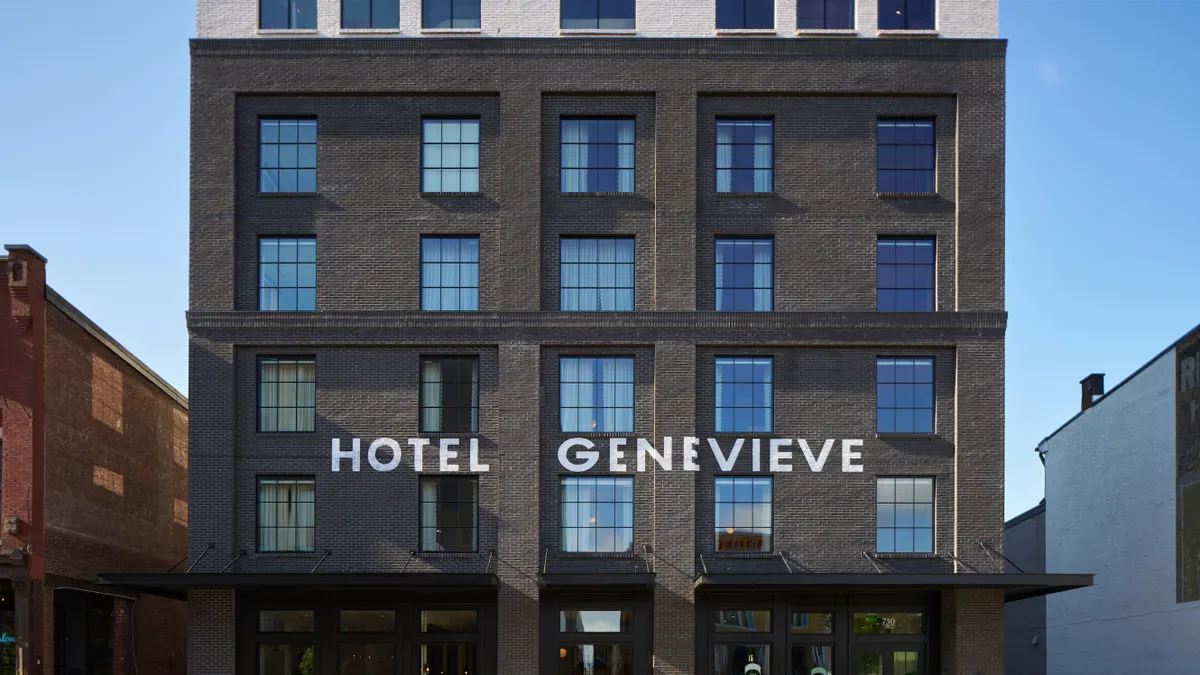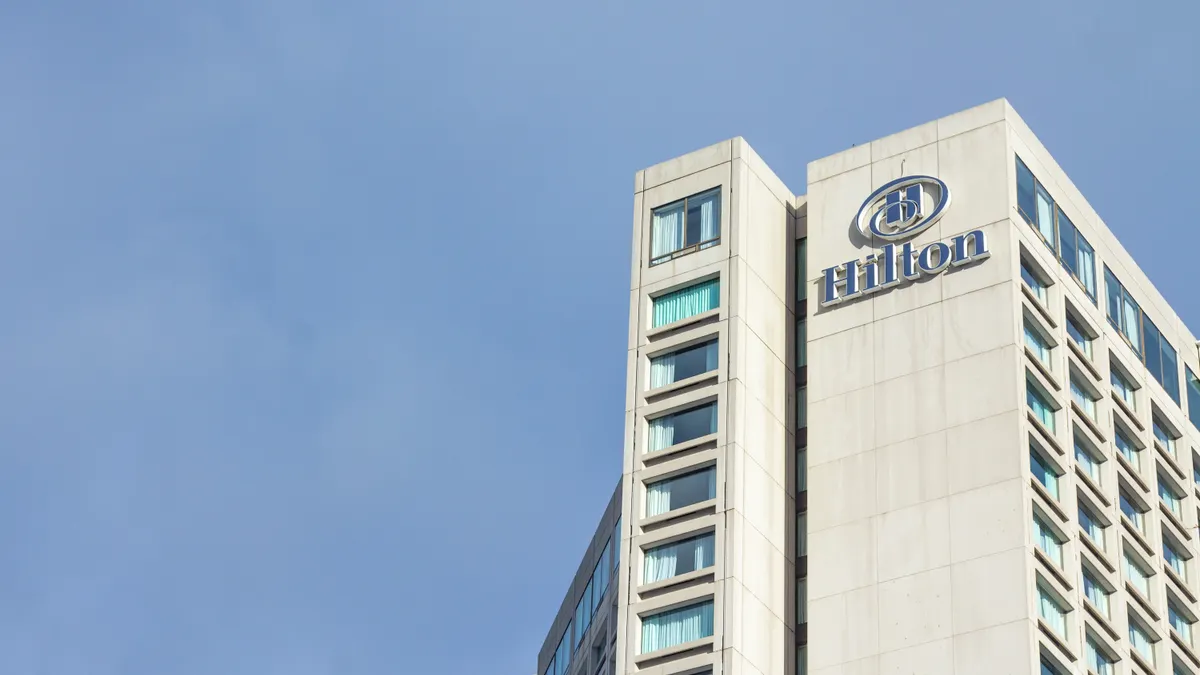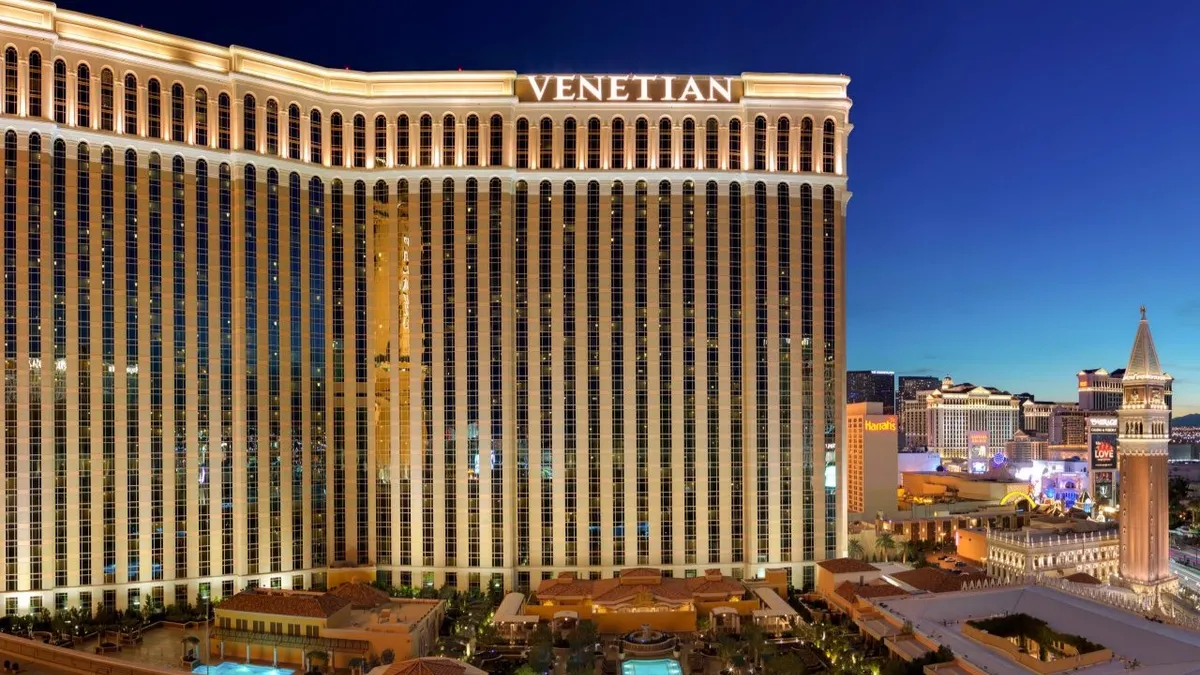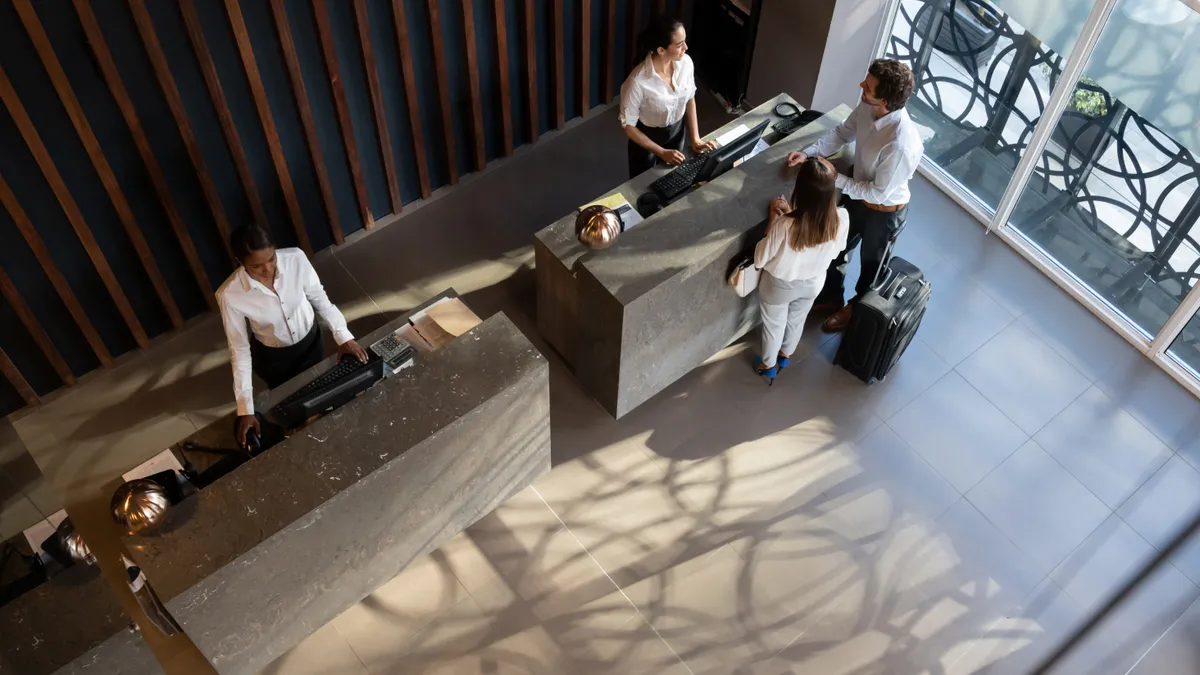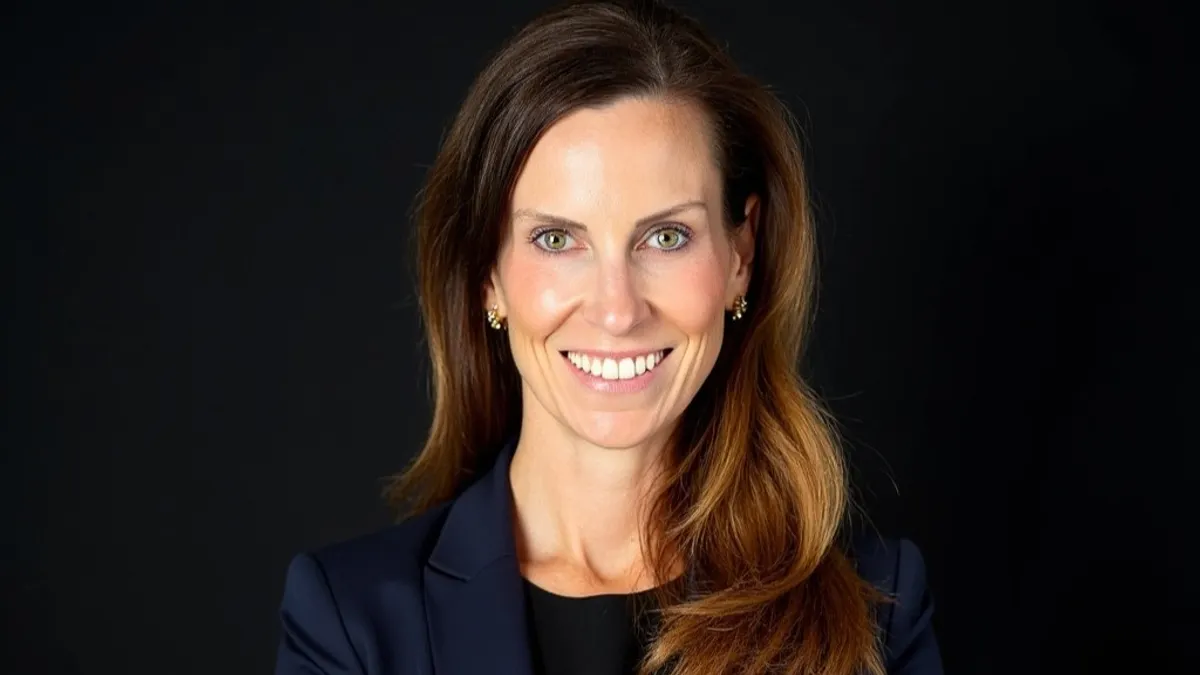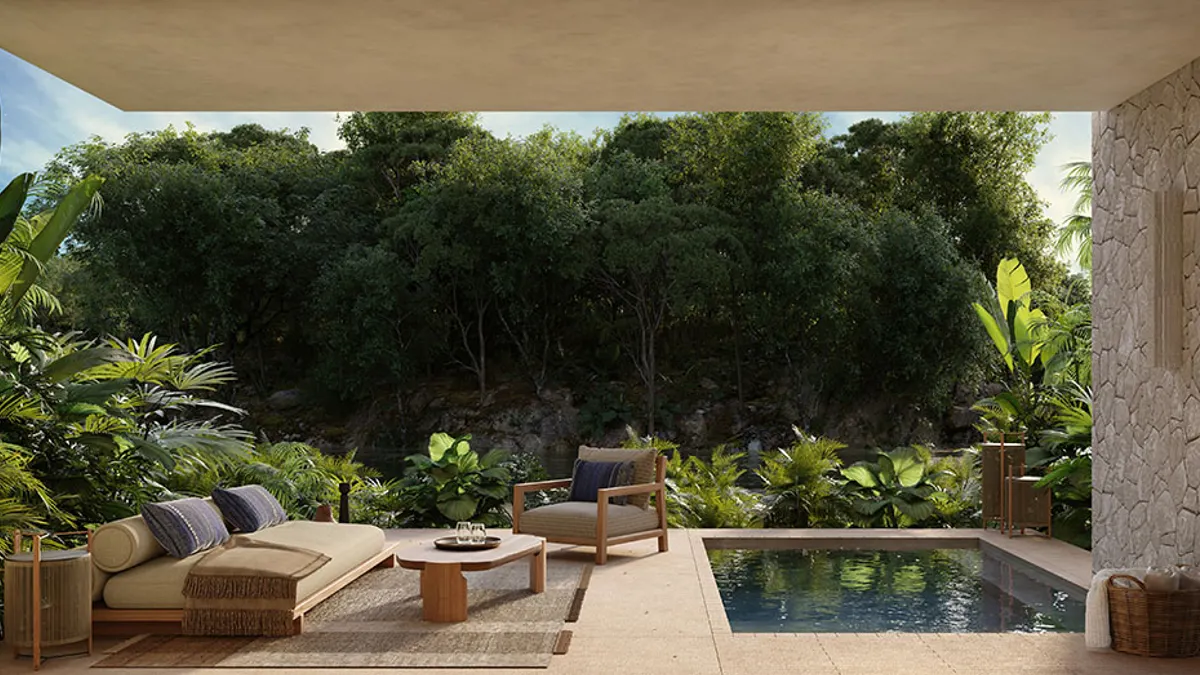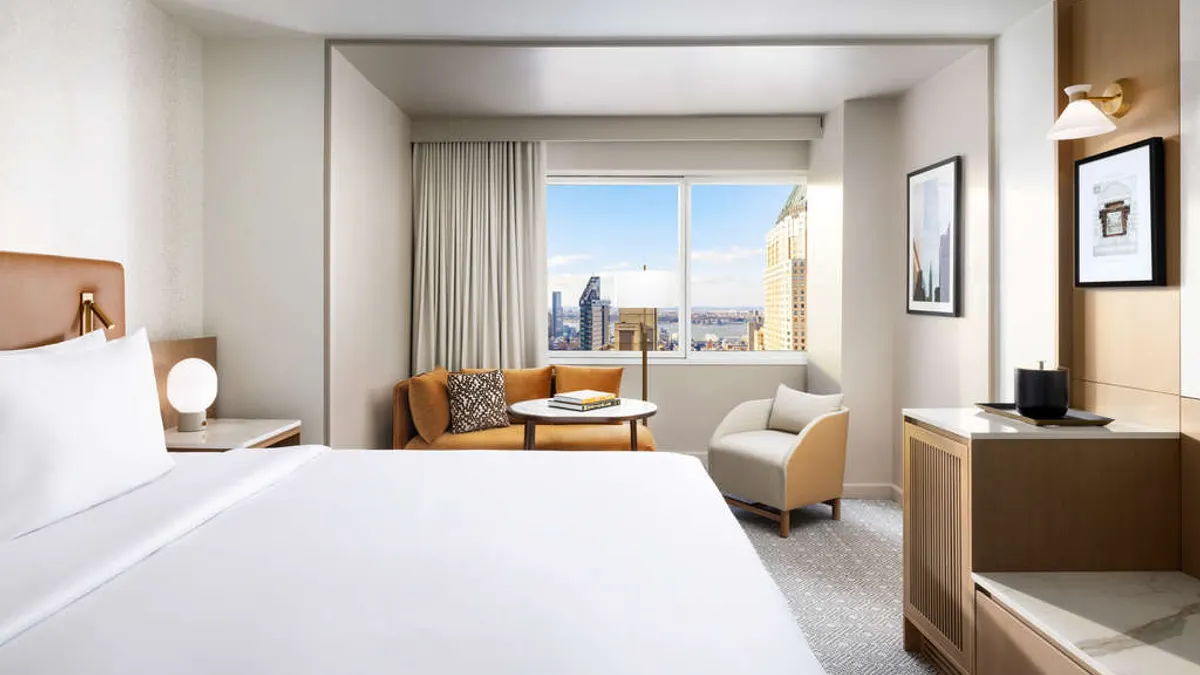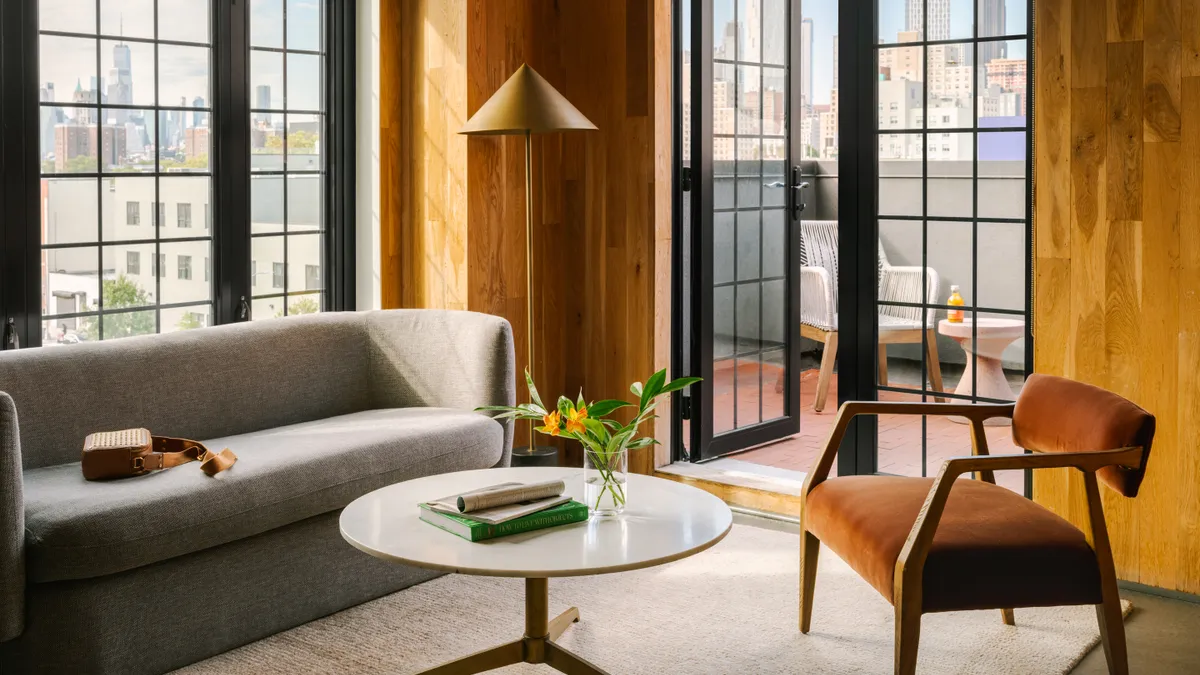Earlier this week, Hyatt announced that World of Hyatt loyalty members can now earn and redeem points at participating Bunkhouse Hotels properties.
Hyatt assumed the Bunkhouse brand — including roughly a dozen boutique hotels centered on design, music and community-driven events — in October as part of its acquisition of lifestyle hotel operator Standard International.
While many Bunkhouse-branded hotels are set to remain under the flag following the deal, Hotel Genevieve in Louisville, Kentucky, recently converted to JdV by Hyatt, a collection of independent hotels.
Following the transition, Stephen Wendell, CEO of Mountain Shore Properties, which owns Hotel Genevieve, sat down with Hotel Dive to share the logistics behind the rebranding, how the hotel is faring one year after the Hyatt-Standard deal was first announced and why the competitive lifestyle segment poses a big opportunity for hotel players industrywide.
This interview has been edited for brevity and clarity.
HOTEL DIVE: What has the transition from Bunkhouse Hotels to JdV by Hyatt been like?
STEPHEN WENDELL: When you do a Standard or Bunkhouse project, you're paying them design fees and technical services fees to pre-open, and they help you concept the property. They also serve as manager. I call this a “manchize” agreement.
It's very unlike anything you do with traditional brands today, where you pay them franchise fees and they give you the rules of the road, then you hire your own management company, branding company and interior design company.
“We built this to be a fully identifiable boutique hotel, and any good boutique hotel should not identify with whatever larger brand it’s affiliated with, or who’s managing it."

Stephen Wendell
CEO of Mountain Shore Properties
Hotel Genevieve is staying in the same family, which is now the lifestyle division at Hyatt, but it’s moved from this “manchize” agreement to a traditional franchise agreement. As a result, we brought in a different third-party management company to operate the hotel, Olympia.
However, Hotel Genevieve has stayed largely the same. We built this to be a fully identifiable boutique hotel, and any good boutique hotel should not identify with whatever larger brand it’s affiliated with, or who’s managing it. It should be its own thing. I think we’ve done a good job of continuing the vision of Hotel Genevieve, but in the background, a lot has happened.
To transfer to a brand system where Hyatt’s reservation system, loyalty program and property management system are acting in the background, there is so much, technologically, that has to happen.
Our PMS, for example, changed to Hyatt’s Opera. The reservation system also changed, as did the third-party company that we use to market the hotel. We had to build a whole new website. Hotel Genevieve has the same owners, but we’ve changed management companies, therefore we had to change banking processes.
Those are some of the many examples of changes that had to be made while continuously operating the hotel. It would be a much easier task if we were preparing to open and setting up all those systems, but we needed everything to die one day and at 12:01 a.m. the next, be back up and running.
As of June 26, we were converted over. It happened overnight like it was supposed to, and we've been rocking and rolling ever since.
What are the pros and cons of joining JdV by Hyatt?
After one month, we've already seen hundreds of World of Hyatt bookings and redemptions, and we're seeing the lift that a powerful distribution system can give.
If you're trying to compete against the larger hotel brands in a completely independent fashion, it's extremely difficult, and perhaps more difficult now than it's ever been. If you're aligned with them, you're going to see a lot of lift that you otherwise didn't when you weren't, and so that's what we're beginning to see, and it's exciting.
What benefit can Hyatt’s loyalty program provide, specifically?
Ten years ago, I think Hyatt had something like 8 million reward customers, and now they have close to 60 million, so they have expanded incredibly.
“If you're trying to compete against the larger hotel brands in a completely independent fashion, it's extremely difficult, and perhaps more difficult now than it's ever been.”

Stephen Wendell
CEO of Mountain Shore Properties
Hyatt is a bit more selective with where they put hotels. Louisville is a market where they only have one Regency, and now, there’s Hotel Genevieve. Alternatively, there's probably more than 10 Hiltons and Marriotts each in that marketplace.
If a Hyatt rewards customer is looking to come to Louisville and looking at the downtown market for a hotel, only the Regency was an option before and that is a more corporate-focused, larger hotel. Hotel Genevieve is a boutique option that offers something in the cool part of town, so we think it's really going to resonate with the Hyatt customers.
Why is expanding in the lifestyle segment a big opportunity for Hyatt?
Hyatt acquired Standard, including the Bunkhouse brand, to really bolster its lifestyle division, its personnel, and try to create something that would stand apart from its competitive set.
Ten years ago, all these big hotel companies were resisting the lifestyle movement, and now they're fully bought in. All of them have now acquired one or more companies that were operating smaller, independent collections of hotels, so it is clearly the way that the consumer is moving.
We're in the very early days of what lifestyle at scale is going to look like. The big reason for Hyatt to acquire Standard is to have independent-feeling hotels across different markets and different countries. And the guest is getting their cake and eating it too. They're getting their rewards points, but they don't feel like they're staying in some can-branded experience that could be anywhere in the world.
The way these hotel companies will be able to scale this — because it doesn't matter if they can add one hotel, that is nothing to their shareholder value, they need to be able to build 100 of them — is through soft brands.
All of the projects that I’m working on right now are soft brands because, as a developer and owner, I don't think the hotel companies can scale in the lifestyle segment by simply putting a Thompson hotel everywhere — or a Nomad hotel to use another Hilton example. Those hard-brand hotels will become synonymous and eventually fall out of favor. You have to spend all the time on the front end to create that unique branding experience.
What you're getting from the hotel companies at the end of the day is a distribution system, and they are constantly working on the (metaphorical) pipes and infrastructure of that system. All the other work is being done on the front end. So, the companies have to let the great developers, designers and branding people flex their creative muscles and do what they're good at — creating beautiful, unique concepts. Then, the companies can connect the customers with those hotels through the pipes of that distribution system.
Currently, no one company is necessarily further ahead in the lifestyle segment, and definitely not so far ahead that a different one couldn’t catch up and become the best. If I’m Hyatt, that is the opportunity. You may never catch Marriott in the global race for portfolio or loyalty membership scale, but you could catch them in this specific category, and that could be a huge win long term.
How can hotel companies that convert independent hotels under their larger distribution systems maintain the unique identity of that boutique property?
It comes down to the people you hire. A company can have all these aspirations of what they think a particular hotel or brand can be, but ultimately, how they staff, train and get buy-in from the people on the ground that are doing the everyday work is what will end up resonating with the guest.


